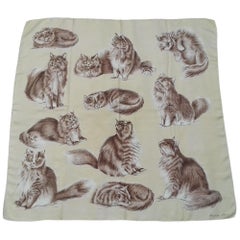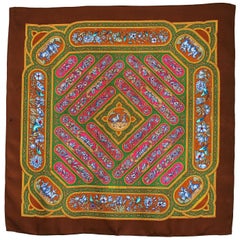Hermes Scarf Persian
Recent Sales
1950s French Scarves
20th Century French Scarves
1990s French Scarves
Mid-20th Century Persian Tribal Persian Rugs
Wool
1950s French Scarves
Hermès for sale on 1stDibs
For Hermès, what began as a maker of leather equestrian goods for European noblemen would eventually grow into one of the most storied fashion labels in the world. In 1837, German-born French entrepreneur Thierry Hermès opened a saddle and harness purveyor in Paris. Gradually, the house extended into accessories and luggage for its riders, and today, in paying homage to its origins, the family-run luxury brand resurfaces horse motifs in everything from clothing and modernist jewelry to pillows and handbags.
The first top-handled bag ever produced by Hermès was the Haut à courroies, which made its debut in 1892. A tall bag secured with a folded leather flap (fastened with bridle-inspired straps), it was designed to transport riding boots and a harness.
As the world made the switch from horse to automobile, the bag adapted, becoming a multifunctional travel satchel instead of a designated saddlebag. Today, 120 years later, the HAC remains in Hermès’s line — and its distinctive flap and clasping straps have laid the groundwork for some of the house’s other iconic bags.
In the 1930s, Robert Dumas (son-in-law to Émile-Maurice Hermès, Thierry’s grandson) designed a smaller, trapezoidal take on the flap bag with a handle and two side straps. Later, actress Grace Kelly, then engaged to Prince Rainier of Monaco, is said to have used one of these bags to conceal her pregnancy during the 1950s. Because she was photographed constantly, the coverage catapulted her handbag to international popularity.
In 1977, Hermès officially renamed the model for her, and the Kelly bag was born. Each Kelly bag takes between 18 and 25 hours to produce, and its 680 hand stitches owe solely to one Hermès artisan.
Robert Dumas was also responsible for another one of the brand’s most iconic offerings: the launch of its first silk scarf on the occasion of Hermès’s 100th anniversary in 1937. Based on a woodblock designed by Dumas and printed on Chinese silk, the accessory was an immediate hit.
Today, vintage Hermès scarves, typically adorned in rich colors and elaborate patterns, serve many functions, just as they did back then. Well-heeled women wear it on their heads, around their necks and, in a genius piece of cross-promotion, tied to the straps of their Hermès bags. Kelly even once used one as a sling for her broken arm.
In 1981, Robert Dumas’s son Jean-Louis Dumas, then Hermès chairman, found himself sitting next to French actress and musician Jane Birkin on a plane, where she was complaining about finding a suitable carryall for the necessary accoutrements of motherhood. After the two travelers were properly introduced, Birkin helped design Jean-Louis’s most famous contribution to the Hermès canon: the Birkin bag, a roomy, square catchall with the HAC’s trademark leather flap top and the addition of a lock and key.
Owing to the brand’s legendary commitment to deft, handcrafted construction, the Birkin is an investment that is coveted by collectors everywhere.
While the Kelly and Birkin may be standouts, gracing the arms of everyone from royal heiresses to hip-hop stars in the past few decades, the handbags are but a small part of Hermès’s fashion offerings.
Since the 1920s, the brand has produced some of the most desirable leather goods in the world. There’s the Constance bag, a favorite of Jacqueline Kennedy, the recently relaunched 1970s-era Evelyne and, on the vintage market, a slew of designs dating back to the 1920s.
Good design never goes out of style. Find a variety of vintage Hermès handbags, day dresses, shoes and more on 1stDibs.
Finding the Right Scarves for You
We’ve long had a love affair with vintage and designer scarves. Every glamorous go-to ensemble deserves the lightweight finishing touch that can be added with this stylish, versatile accessory.
Scarves have held a distinctive place in the evolution of formal and casual wear for centuries. And although now firmly entrenched in western culture, the origins of this neckwear are global.
Egyptian Queen Nefertiti is known to have worn a finely woven scarf with a headdress, and Emperor Cheng of the Chinese Han dynasty presided over an army of warriors whose scarves denoted their rank. The idea of scarves as status symbols still persists; for example, silk scarves, which were favored by the upper class during the reign of Queen Victoria, are an out-of-reach luxury item, cost prohibitive for many consumers. However, the increasing diversity of available materials over the years has rendered this adornment more accessible since their early days.
Luxury houses and various designers helped elevate scarves and long, flowing wraps as a desirable fashion accessory during the 20th century.
Visionary Italian designer Emilio Pucci — the first fashion designer to enter the lifestyle market — introduced abstractions and dazzling psychedelic elements to scarves, while mid-century era multidisciplinary American artist Vera Neumann drew on Japanese techniques to create exuberant textile designs based on her paintings and drawings.
Established in Paris in 1837, Hermès didn’t start creating their famously decorative scarves until 100 years later, in 1937. Before long, the Hermès scarf, then crafted from strong imported Chinese silk, became an iconic work favored by actresses such as Audrey Hepburn and Grace Kelly, a lifetime enthusiast of the family-owned brand. Hermès has produced over 2,000 different scarf designs in the decades since Robert Dumas, Émile-Maurice Hermès’s son-in-law, crafted the first one.
On 1stDibs, find a broad selection of vintage scarves that includes flamboyant and colorful accessories designed by Chanel, Yves Saint Laurent and more.
- Why is Hermès so special?1 Answer1stDibs ExpertMarch 25, 2024Hermès is so special for a few reasons. The French luxury house is one of the most storied fashion labels in the world and has a rich heritage that dates back to 1837.
Hermès began in Paris as a maker of leather equestrian goods for European noblemen. The house later extended into accessories and luggage for its riders, and today, in paying homage to its origins, the family-run luxury brand resurfaces horse motifs in everything from clothing and jewelry to pillows and handbags.
Hermès artisans spend years honing their craft as apprentices before they produce Hermès pieces in premium materials. For example, the Kelly bag, which was named in tribute to one of its biggest fans, Grace Kelly, takes between 18 and 25 hours to produce, and its 680 hand stitches are made by one Hermès artisan. Each Birkin tote is also hand-sewn according to Hermès’s centuries-old saddle-stitching technique, and its exotic leathers, a variety that includes ostrich and crocodile, are subsequently painted and polished by house craftsmen in France.
On 1stDibs, explore a selection of vintage Hermès handbags and accessories.

